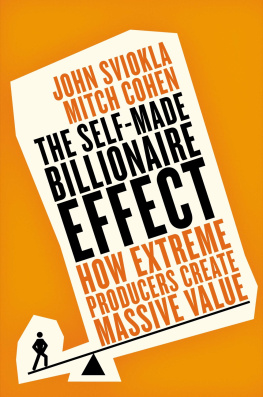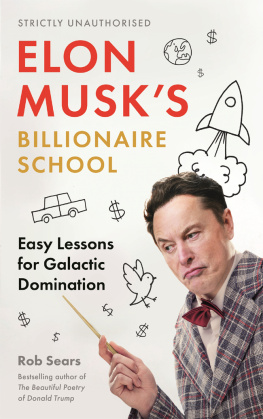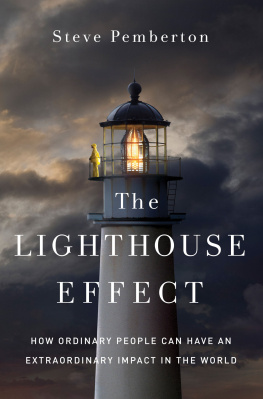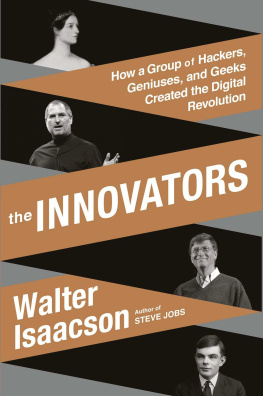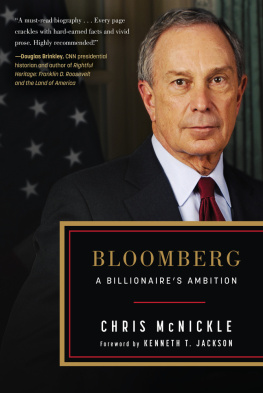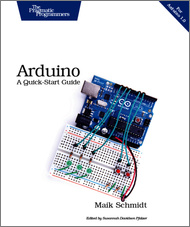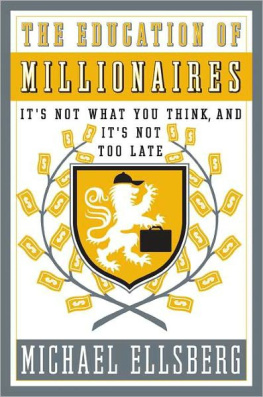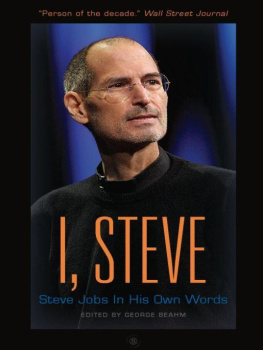John Sviokla - The Self-made Billionaire Effect: How Extreme Producers Create Massive Value
Here you can read online John Sviokla - The Self-made Billionaire Effect: How Extreme Producers Create Massive Value full text of the book (entire story) in english for free. Download pdf and epub, get meaning, cover and reviews about this ebook. year: 2014, publisher: Portfolio, genre: Politics. Description of the work, (preface) as well as reviews are available. Best literature library LitArk.com created for fans of good reading and offers a wide selection of genres:
Romance novel
Science fiction
Adventure
Detective
Science
History
Home and family
Prose
Art
Politics
Computer
Non-fiction
Religion
Business
Children
Humor
Choose a favorite category and find really read worthwhile books. Enjoy immersion in the world of imagination, feel the emotions of the characters or learn something new for yourself, make an fascinating discovery.
- Book:The Self-made Billionaire Effect: How Extreme Producers Create Massive Value
- Author:
- Publisher:Portfolio
- Genre:
- Year:2014
- Rating:3 / 5
- Favourites:Add to favourites
- Your mark:
The Self-made Billionaire Effect: How Extreme Producers Create Massive Value: summary, description and annotation
We offer to read an annotation, description, summary or preface (depends on what the author of the book "The Self-made Billionaire Effect: How Extreme Producers Create Massive Value" wrote himself). If you haven't found the necessary information about the book — write in the comments, we will try to find it.
Imagine what Atari might have achieved if Steve Jobs had stayed there to develop the first massmarket personal computer. Or what Steve Case might have done for PepsiCo if he hadnt left for a gaming start-up that eventually became AOL. What if Salomon Brothers had kept Michael Bloomberg, or Bear Stearns had exploited the inventive ideas of Stephen Ross?
Scores of top-tier entrepreneurs worked for established corporations before they struck out on their own and became self-made billionaires. People like Mark Cuban, John Paul DeJoria, Sara Blakely, and T. Boone Pickens all built businessesin some cases, multiple businessesthat are among todays most iconic brands. This fact raises two profound questions: Why couldnt their former employers hang on to to these extraordinarily talented people? And why are most big companies unable to create as much new value as the worlds roughly 800 self-made billionaires?
John Sviokla and Mitch Cohen decided to look more closely at self-made billionaires because creating $1 billion or more in value is an incredible feat. Drawing on extensive research and interviews, the authors concluded that many of the myths perpetuated about billionaires are simply not true. These billionaires arent necessarily smarter, harder working, or luckier than their peers. They arent all prodigies, crossing the billionaire finish line in their twenties. Nor, most of the time, do they create something brand-new: More than 80 percent of the billionaires in the research sample earned their billions in highly competitive industries.
The key difference is what the authors call the Producer mind-set, in contrast with the far more pervasive Performer mind-set. Performers strive to excel in well-defined areas, and are important. But Producers are critical to any company looking to create massive value because they redefine whats possible, rather than simply meeting preexisting goals and standards. Combining sound judgment with imaginative vision, Producers think up entirely new products, services, strategies, and business models.
Big companies tend to reward Performers and discourage the unconventional ways of Producers. But its the latter who integrate multiple ideas, perspectives, and actions, and who trust their insights enough to make game-changing bets.
This book breaks down the five critical habits of mind of massive value-creators, so you can learn how to identify, encourage, and retain such individualsand maybe even become one yourself. The Self-made Billionaire Effect will forever change the way you think about talent and business value.
John Sviokla: author's other books
Who wrote The Self-made Billionaire Effect: How Extreme Producers Create Massive Value? Find out the surname, the name of the author of the book and a list of all author's works by series.

